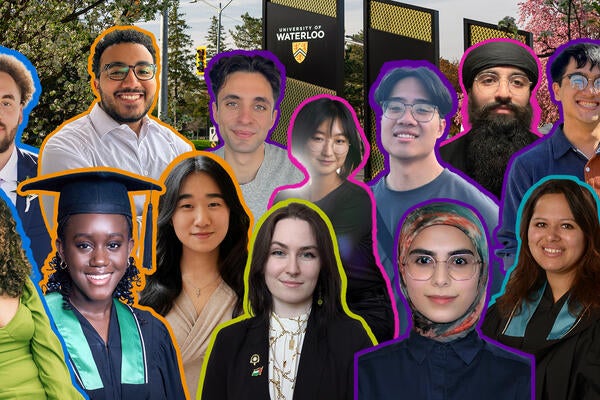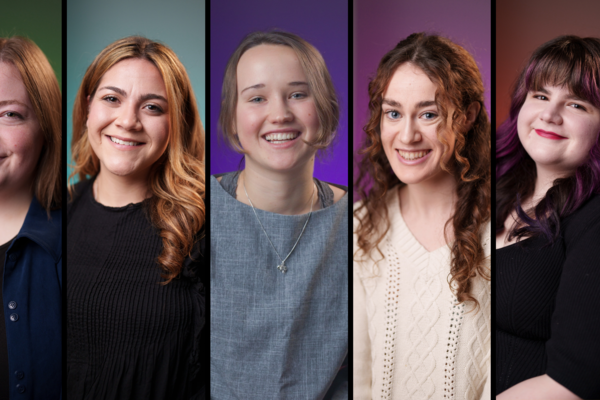
Prestigious Banting Postdoctoral Fellows come to Waterloo
The two-year, $-70,000 Banting fellowships have been awarded to three top researchers at the University of Waterloo

The two-year, $-70,000 Banting fellowships have been awarded to three top researchers at the University of Waterloo
By Media RelationsWATERLOO, Ont. (Monday, September 17, 2012) - Could gravity become a tool in quantum information science? Is sustainability able to incorporate both human and environmental needs? Can we build a computer that sees? Three top researchers at the University of Waterloo have been awarded prestigious Banting Postdoctoral Fellowships to probe these and other questions.
The two-year, $-70,000 Banting fellowships have been awarded to three top researchers at the University of Waterloo. James Bergstra and Eduardo Martin-Martinez have received the fellowships from the Natural Sciences and Engineering Research Council of Canada (NSERC). Prateep Nayak was awarded a Banting fellowship by the Social Sciences and Humanities Research Council (SSHRC).
“We are delighted to attract these three world-class young scholars to the University of Waterloo,” said Sue Horton, associate provost, graduate studies at Waterloo. “The Banting fellowships enable to us to compete internationally for these extraordinarily talented individuals."
Bergstra’s research uses computer simulation to replicate vision. His theory is that our retina divides vision into familiar image fragments. Our brains then decode them using simple mathematical transformations. Using insights from cognitive neuroscience, his work has exciting potential applications to human vision and artificial intelligence. He comes to Waterloo from the Rowland Institute at Harvard, and will work with Professor Chris Eliasmith, the Canada Research Chair in Theoretical Neuroscience, in the Centre for Theoretical Neuroscience.
“Much has been discovered about the function and anatomy of the human brain, but replicating sight in computer simulations remains a challenge,” said Bergstra.
Eduardo Martin-Martinez works in quantum information science. His field of specialization — the quantum effects induced by gravity — has seen a huge expansion worldwide. Martin-Martinez will probe gravity’s impact on quantum information, seeking novel effects, higher reliabilities in information processing protocols, and greater understanding of quantum entanglement.
Martin-Martinez has completed more than 20 refereed articles, with more than 275 citations, has been published in leading journal Physical Review Letters. At Waterloo, he will work with Professor Achim Kempf, Canada Research Chair in the Physics of Information.
“The project has a strong potential to produce contributions to quantum information science and technology, quantum optics, quantum simulations and quantum gravity,” said Martin-Martinez.
Sustainability researcher Prateep Nayak is a Trudeau scholar and former Giorgio Ruffolo Doctoral Fellow in Sustainability Science at Harvard University’s Center for International Development. His work examines ecosystems as social-ecological entities, in which both human actions and biophysical systems affect each other. These systems are subject to abrupt, often irreversible change thanks to climate change, globalization and other factors. Nayak explores these massive shifts, and evaluates their implications for governance.
“Quality of life of people, in Canada and globally, is integrally linked to the environment,” said Nayak. “Insights from this research will offer novel tools and methods for freshwater, marine, coastal and forest ecosystems’ sustainable use, and thereby contribute to food security and human well-being.”
The Banting Postdoctoral Fellowships Program is designed to attract and retain top-tier postdoctoral talent, both nationally and internationally, to develop their leadership potential and to position them for success as research leaders. Seventy new fellowships are awarded each year. More information about the program, please visit banting.fellowships-bourses.gc.ca.

Read more
The Government of Canada announces funding for discovery and applied research in engineering, natural sciences, health and social sciences

Read more
Meet the 13 exceptional students representing Waterloo’s newest grads

Read more
Graduating students share stories of how Waterloo’s co-op program will shape their future careers
The University of Waterloo acknowledges that much of our work takes place on the traditional territory of the Neutral, Anishinaabeg, and Haudenosaunee peoples. Our main campus is situated on the Haldimand Tract, the land granted to the Six Nations that includes six miles on each side of the Grand River. Our active work toward reconciliation takes place across our campuses through research, learning, teaching, and community building, and is co-ordinated within the Office of Indigenous Relations.